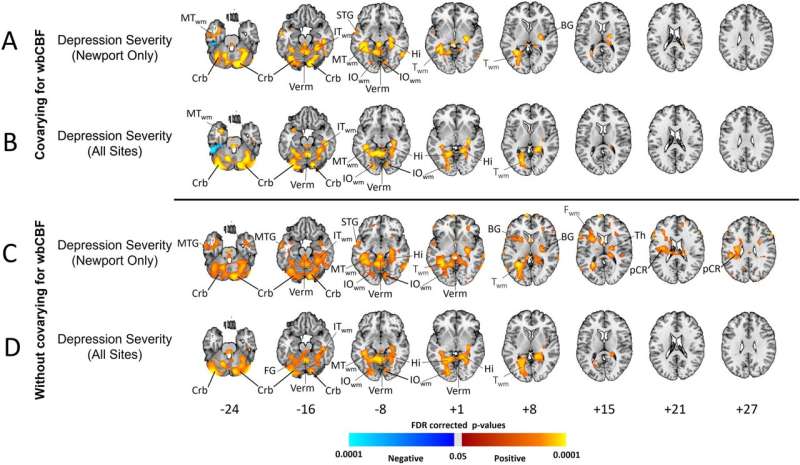This article has been reviewed according to Science X's editorial process and policies. Editors have highlighted the following attributes while ensuring the content's credibility:
fact-checked
peer-reviewed publication
trusted source
proofread
Behavioral health researchers study hundreds of brain scans to explore the biology of depression

In the last 50 years, behavioral health researchers have made major progress in understanding depression not as a condition born purely from lived experiences, but as a multi-faceted disorder with complex underlying biology. A growing body of research has increased understanding of the biology of depression at the cellular level as well as potential targets for innovative treatments.
In a new study published in Translational Psychiatry, Bradley Peterson, MD, Director of the Brain Imaging Lab at Children's Hospital Los Angeles and several Behavioral Health Institute researchers explore the connection between cerebral blood flow and depression severity.
The researchers partnered with a multi-site private psychiatry practice to analyze brain scans of 338 patients with major depressive disorder and 103 healthy controls. The dataset includes scans from patients age 18 to 65 and spans eight sites across the United States.
One of the largest and most representative studies of its kind, this research provides new insight into how blood flow represents functional problems in regulatory structures of the brain associated with depression—and points to cellular metabolism as a key mechanism behind the progression and severity of the disorder.
Regional cerebral blood flow affects brain regulatory circuits
Researchers' analysis of the SPECT brain scans showed a global increase in cerebral blood flow for patients with depression when compared to the healthy control group. However, what fascinated researchers most was how blood flow varied by region.
Regional cerebral blood flow was disproportionately higher in the brain's limbic structures, including the basal ganglia, thalamus and cerebellum. These structures regulate our bodies' most essential cognitive processes like thought, attention, emotion and behavior.
"Problems in these regulatory circuits of the brain are consistent with long-known cognitive and attentional challenges that people with depression have, from impaired concentration to rumination and overall low mood," Dr. Peterson shares.
Mapping metabolism to depression severity
Identifying increased blood flow throughout these key regions of the brain offers researchers a clue to the true biological culprits underlying depression: metabolism and cellular activity.
"It's not blood flow per se that we're interested in, it's what the blood flow indexes," adds Dr. Peterson.
Metabolism is driven by increased cellular activity. Hypermetabolism results when cells use excessive amounts of energy requiring increased blood flow. "There seems to be a global disruption of cellular functioning and metabolism in the brains of depressed people," says Dr. Peterson, "Something isn't running efficiently in the cells and isn't appropriately controlling energy use."
Increases in blood flow were also proportional to the severity of depression, leading researchers to believe that hypermetabolism is pathological—resulting from structural or functional differences in biology—rather than compensatory, as compensation would inversely correlate decreased cerebral blood flow with depression severity.
Implications for pediatric behavioral health
While the dataset for this study utilized brain scans from people age 18 and older, Dr. Peterson says that this research is part of a larger effort at the Behavioral Health Institute to understand how and where depression starts in kids.
"There's every reason to believe that most forms of depression in children have a similar cause or pathophysiology as adult depression," he says, primarily because many forms of adult depression begin in childhood. "This study indirectly tells us about the biology of depression in kids."
What's next: A deeper dive into hypermetabolism's impact on the brain
The rich data from this multi-site, multi-generational study empowers Dr. Peterson and team with enough insight to build follow-up studies that continue to advance understanding of depression mechanisms and illuminate potential treatments.
Most critically, the researchers believe hypermetabolism may be a reasonable target for novel depression therapeutics, and future research could seek to uncover the specific cellular components underlying metabolic dysfunction.
"With this large dataset, we hope that the findings will more adequately represent what's happening in the brain of the average person in the United States rather than in some small select corner," says Dr. Peterson. "Most importantly, it tells us where in the brain we need to start looking."
More information: Bradley S. Peterson et al, A multi-site 99mTc-HMPAO SPECT study of cerebral blood flow in a community sample of patients with major depression, Translational Psychiatry (2024). DOI: 10.1038/s41398-024-02961-5




















